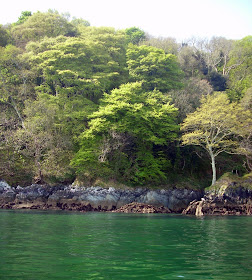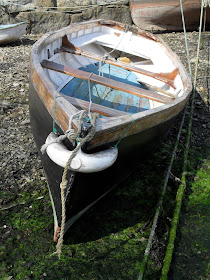Had a special sail today because Mum and Dad joined me for a fast sail across to Cawsand on the western side of Plymouth Sound. The wind was breezy and Arwen kept an average of 4.8 knots all the way across. The wind was coming from the north-west so it was a good close haul at times. It came gusting over the Mt. Edgecumbe headland. The sea went from glassy like to severely rippled in seconds! We departed QAB at 9.55am and were on the beach at Cawsand at 10.30 – 35 minutes to do 3 nautical miles or so. That’s pretty good going. There was weather helm and I was able to use it to help me work out when to loosen the mizzen slightly. At one point we furled the jib as we were over canvassed.
We stopped off on the shingle beach at Cawsand. Here it was sheltered from the northerly gusts and there were just very gentle tiny waves lapping on the shore. Mum and Dad were dispatched to get coffees but somehow arrived back with ice creams.....a sure sign of senility setting in! The Cawsand Ferry arrived to disgorge its contents onto the beach.
After ice creams, it was back on board. Now pushing Arwen off the beach, turning her bow back out to sea and jumping on board whilst starting the outboard, lowering the rudder and getting her underway in an appropriate direction is always tricky but somehow we managed it without embarrassing ourselves in front of all the beach masses.
Going back was slower, much slower. The wind had dropped and we floated about off fort Picklecombe listlessly for 20 minutes or so before the wind suddenly veered around to blow from the immediate south. This put us on an excellent beam reach down the outside of the breakwater and we picked up some speed. We covered the length of the breakwater inside of 25 minutes averaging 3.5 kts.
There were some nice older boats out with us – I have no idea what they were – but they were wood, old with big tan sails and very elegant! As we turned to head north we were buzzed by returning dive ribs going back into fort Bovisand dive centre.
We did a dead run down the eastern side of Plymouth sound, doing the odd gybe as I tried to do for speed not angle. All the time we kept a look out for the return of the porpoise but it was not to be. They’d clearly moved on. At south mallard buoy we gybed to starboard and set off on a beam reach along the river plym through the Cattedown. Just off yacht haven marina we turned head to wind and dropped all sails, motoring back onto the pontoon at QAB for 3pm. Five hours and a grand day out. No porpoise but plenty of gannets in Cawsand Bay, another very rare sight.
Coffees and a quick clear up and home in time for tea. A cracking day out.
Steve
We stopped off on the shingle beach at Cawsand. Here it was sheltered from the northerly gusts and there were just very gentle tiny waves lapping on the shore. Mum and Dad were dispatched to get coffees but somehow arrived back with ice creams.....a sure sign of senility setting in! The Cawsand Ferry arrived to disgorge its contents onto the beach.
After ice creams, it was back on board. Now pushing Arwen off the beach, turning her bow back out to sea and jumping on board whilst starting the outboard, lowering the rudder and getting her underway in an appropriate direction is always tricky but somehow we managed it without embarrassing ourselves in front of all the beach masses.
Going back was slower, much slower. The wind had dropped and we floated about off fort Picklecombe listlessly for 20 minutes or so before the wind suddenly veered around to blow from the immediate south. This put us on an excellent beam reach down the outside of the breakwater and we picked up some speed. We covered the length of the breakwater inside of 25 minutes averaging 3.5 kts.
There were some nice older boats out with us – I have no idea what they were – but they were wood, old with big tan sails and very elegant! As we turned to head north we were buzzed by returning dive ribs going back into fort Bovisand dive centre.
almost 11 nautical miles - a nice day's sailing
We did a dead run down the eastern side of Plymouth sound, doing the odd gybe as I tried to do for speed not angle. All the time we kept a look out for the return of the porpoise but it was not to be. They’d clearly moved on. At south mallard buoy we gybed to starboard and set off on a beam reach along the river plym through the Cattedown. Just off yacht haven marina we turned head to wind and dropped all sails, motoring back onto the pontoon at QAB for 3pm. Five hours and a grand day out. No porpoise but plenty of gannets in Cawsand Bay, another very rare sight.
Coffees and a quick clear up and home in time for tea. A cracking day out.
Steve































